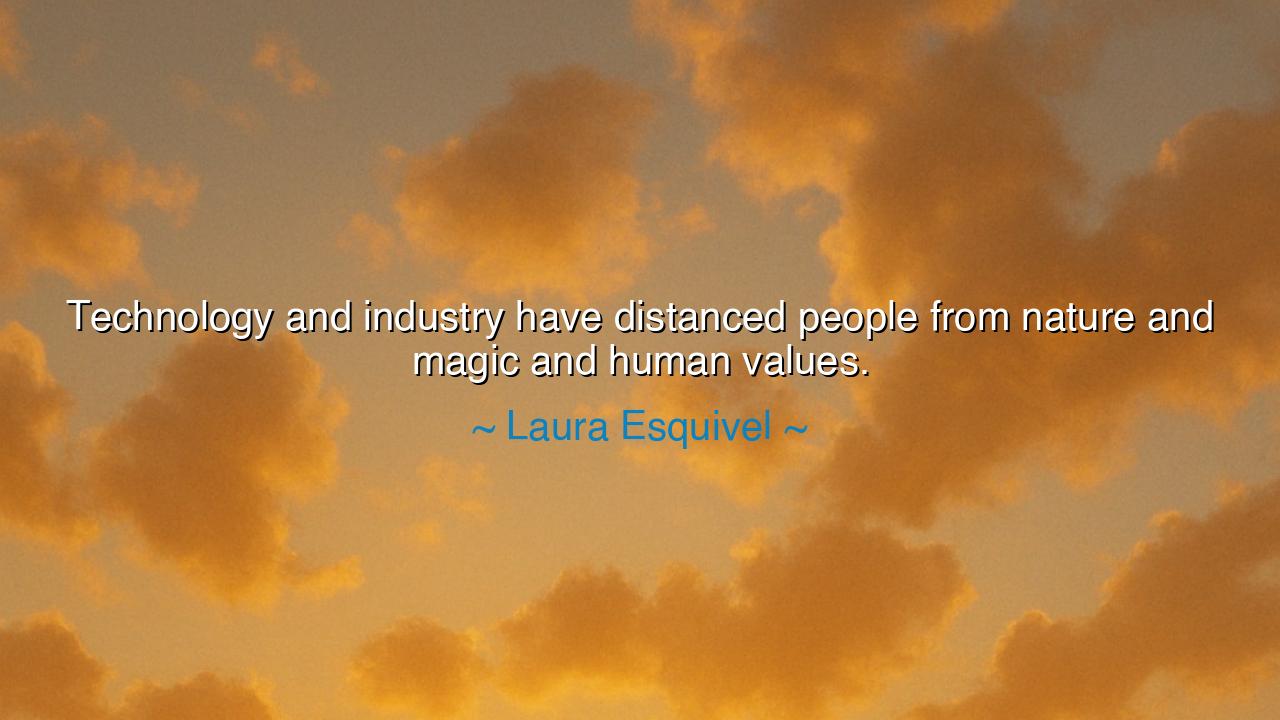
Technology and industry have distanced people from nature and






Hear the voice of Laura Esquivel: “Technology and industry have distanced people from nature and magic and human values.” In this utterance lies a lament and a warning, but also a call to remembrance. For in chasing the machines of iron and the smoke of progress, mankind has wandered from the sacred groves of the earth, where once the heart beat in rhythm with the seasons and the stars. The ancients knew that to live was to walk hand in hand with the natural world, to feel the whisper of the wind as counsel, to see the fire as both warmth and mystery. But now, the roar of engines and the glow of screens drown out these older songs.
Once, to rise with the dawn was to be awakened by the cries of birds and the warmth of the sun. To eat was to break bread crafted by one’s own hands, drawn from fields tilled by sweat and song. To heal was to know the plants and the waters, to draw upon the earth’s magic, which was not illusion but the secret harmony of all things. Now, many awaken to alarms and artificial lights, consume food that knows no soil, and seek healing only in laboratories of steel. This is not evil, but it is distance, a severing of roots, and without roots, even the strongest tree may fall.
History bears witness to the dangers of forgetting. Consider the Industrial Revolution, when smoke darkened the skies of Europe, and the rivers ran thick with poison. Towns once alive with festivals of harvest became crowded with factories, their bells dictating the rhythm of life. In Manchester, children worked in the mills before their bones had even grown strong, and the song of the lark was replaced by the hiss of steam. Progress brought power, yes, but it came at the cost of human values, at the loss of harmony with nature. Where once men and women lived by the turning of the moon, they became cogs within machines, and the spirit within them dimmed.
Yet even amidst this, voices rose to remember. Poets like William Blake warned of the “dark satanic mills,” reminding the people that the soul must not be sacrificed to the furnace of industry. The Romantics fled to the hills, seeking again the rivers and forests that still held the forgotten magic. Their cry was not against progress itself, but against progress without heart, against growth that crushes rather than nurtures. Esquivel’s words are a continuation of that cry, echoing through the ages: do not let the fire of technology consume the light of humanity.
For the truth is this: technology is not our enemy, nor is industry. They are tools, born of human ingenuity, capable of serving great good. But when they blind us to the sacredness of the earth, when they drown the voice of the heart, they become chains rather than wings. The task of this generation, and of every generation to come, is to unite the two—to build machines that honor the earth, to weave progress with compassion, to let the pulse of human values guide the march of innovation.
And so the lesson is clear: return to the soil, even if only for a while. Walk in the forest without a device in your hand, and let the silence speak. Plant something with your own fingers, even if it is only a single flower in a pot, and remember that you, too, are rooted in the earth. Read the old stories, the myths where magic was not a trick but a way of seeing the sacred in the ordinary. Speak to your neighbor with presence, not through the veil of the machine, and let human values breathe again in your daily life.
Practical actions are simple but profound. Create balance: let the tools of technology serve you, but do not serve them. Reclaim moments of stillness from the grasp of industry. Teach children the names of the stars and the songs of birds, so that they grow with wonder rather than only with wires. Remember that to be human is not only to build, but to love, to feel, to belong to the great web of life.
Thus, O seeker, hold these words as a compass: do not despise technology, but do not forsake nature. Do not scorn industry, but do not forget magic. For in the union of the two lies the path of wisdom. To live fully is to walk with one foot in the world of progress and the other in the eternal soil of the earth, carrying forward both the gifts of the mind and the treasures of the soul.






AAdministratorAdministrator
Welcome, honored guests. Please leave a comment, we will respond soon